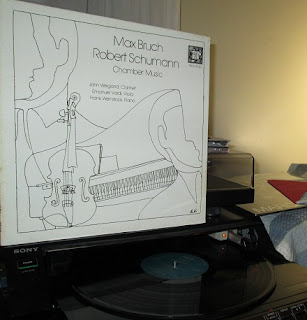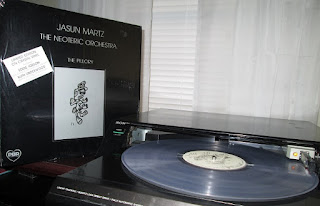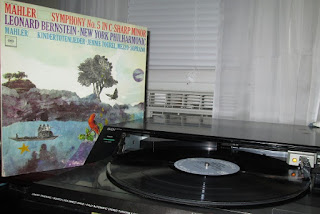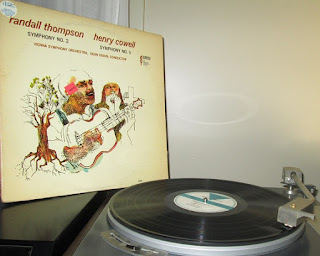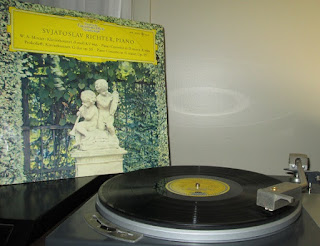Y'know, I think I kinda chumped-out with
the last entry back in August. Maybe too long on visuals and short on
prose – not much relating to the listening process. As it happens,
I've been experimenting with more non-classical listening over the
past year so the “serious” music consumption has diminished
relative to previous years. Not that the general enthusiasm has waned
particularly. I still find myself checking out new sounds and old
favorites periodically. Problem is – there isn't a whole lot from
the “serious music” world I don't like or, more accurately, that
I intensely dislike. Most of what I've managed to listen to so far
has been generally agreeable. No major complaints. Wide-ranging
tastes can have a downside, though.
Unlike some “serious music”
listeners I don't have a dedicated focus – like only 20th
Century or mainly Baroque music. I find it baffling how Glenn Gould
considered Mozart a “crap” composer! Not to mention the wholesale
rejection of anything Beethoven by the more extreme modernist
pundits. I wonder how people can be so discerning to the point of
negating entire sub-genres of music. If anything I have the opposite
problem – I want to hear it all!
I suppose my path is not meant to
include being a connoisseur of any particular area of this music. How
am I supposed to be a more discerning listener if I keep skimming the
surface? Actually – one of my most popular entries here was the
Tchaikovsky 4th Symphony shoot-out I did way back. It was
fun and gave me a better grasp on that excellent piece and my own
reactions to it. So that's one way an average listener like me can
dig deeper. It also helps when I get the opportunity to hear new (to
me) interpretations of pieces – witness this new Tchaikovsky 4th
I picked up last weekend.
I'm sure I have a few more recordings
from the Orchestre de la Suisse Romande somewhere in the stacks
though I'm not too sure about conductor Ataulfo Argenta. What got my
attention here was the vintage of the disc – no doubt a late 50s /
early 60s London “blueback” in STEREO! Oh, yeah – this is fun
stuff especially if the disc is in reasonable shape (which was the
case for this one). As it turns out, the LP could use a better
cleaning than I was able to give it, but the performance was highly
enjoyable. Yet, with some interesting interpreations of various
passages – some parts played faster, some slower. I'd like to put
this version up against my preferred Munch / BSO performance.
Yet, that kind of activity would easily
cut into “new music listening time”. And there's still plenty of
music I haven't heard yet, so how much time do I spend with the
Tchaikovsky symphonies? It's like The Beatles, in a way. Or Hendrix.
I've heard those albums so many times – it's great to hear them
periodically, but I know that music well enough. The crazy thing is –
I want to hear more pieces – stuff I've never heard before. I like
getting that buzz off a new piece of music. Yet, trying to get a
handle on the “best” performances of any given work is a
time-consuming endeavor to say the least! Especially when one is
dealing with looooong pieces. It takes time to do a proper shootout
with classical music. Heck, it can take me a long time to really
understand a piece of popular music only 3 minutes long, let alone a
full 45-minute symphony. So it can be a bit slow going, though I'm
really in no hurry. My long-range goal is to have a reasonable grasp
on this music over the course of the next 12- 13 years. Which could
go pretty quickly, come to think of it!
As I'm writing this, it dawns on me
I've been actively listening and investigating “serious music”
for about five years now. Where did that time go? This blog has been
a going concern for most of that time too. In a way, the idea of all
this listening and writing was not to reject any other music I always
enjoyed (and still do), but to open the pathways to other sounds,
forms, vibrations. And there's a LOT of that in the “classical”
realm. Vinyl records have been a fun way for me to engage with this
music and there are still a lot of platters left to plunder in all
sorts of places. That is if you're into vinyl. If not – compact
discs are also crazy plentiful as well – and cheap! The last few
times I'd been down to the Princeton Record Exchange I honestly did
not have the patience to sift through all the piles of used classical
CDs – I mean stupid amounts at good prices! And there are plenty of
surprises left at the odd thrift store now and again. Just the other
week I scored a copy of John Adams' opera “Nixon in China” for
$1.99 on CD. Haven't listened to it yet, but I'll get there. Along
with a handful of other John Adams discs I've picked up at thrift
stores over the years.
Yet, it is curious to consider why I've
held off playing some of those John Adams discs. As of yet, I have
not heard one second of this composer's music. The discs are on the
shelf – waiting. And they've been waiting. Now I could always
simply say I haven't gotten around to it. Yet, there can be a vibe of
wariness when it comes to taking the plunge with a modern composer's
music for the first time. Having dipped my toe into Stockhausen, for
example, I have been holding off on investigating further – not
because what I heard repelled me. Quite the contrary! I found his
music fascinating yet I realize there can be a larger commitment to
diving in deeper which Stockhausen's music practically demands. So,
realizing I've already got Stockhausen on the back burner, how many
more new composers do I put up in the queue? Once again, time is the
enemy of the modern humanoid with thirsty ears. So, another year goes
by without John Adams on the stereo.
And, in the grand scheme of things,
John Adams is one of the more established modern composers. There are
a host of cutting edge, “new” composers who are infinitely more
obscure than Adams. What about their music? All of this rumination
has led me to several conclusions:
- The acceptance conclusion – you just won't manage to hear it all. Three choices emerge, therefore: A) listen to only new music all the time in a desperate attempt to almost hear it all, B) ignore all new music since you will never gain a reasonable grasp upon it anyway or C) find a balance between the new and old music that suits you and try not to worry what you're missing from either angle.
- The familiarity conclusion – too much or too little familiarity is usually the deal-breaker. It isn't about the “noisy” nature of modern music. Some of my favorite noises are loud, yet familiar – like thunderstorms. I sure like the sound of those. Yet, some music demands greater attention to process due to the unfamiliar nature of what is happening. Conversely, too much familiarity can undermine a listener's enjoyment as well. I was just listening to a chamber music LP of composer Max Bruch.
- The temporal conclusion – time doesn't grow on trees. Listening to abrasive, challenging music at the end of the day is not always high on the priority list. Sometimes the ordered world of the Baroque composers is what appeals to the ears most. Making time for the challenging music – be it classical, rock or jazz – can have its rewards. Ornette Coleman's music sounds like an old friend to me every time we reconnect. Yet, sometimes predictably resolving patterns are just what the doctor ordered, kimosabe. Everything has its season. From the weird and wonderful to the non-weird and wonderful.
He lived at the tail end of the 19th century, yet his music remains obscure for many people today. One theory offered in the liner notes had to do with the lack of tension in the music – it is perhaps too logical for modern ears and not innovative enough. The polar opposite might be this record of piano music by George Crumb. Fascinating, not very hummable, yet enjoyable if one is in an adventurous mood.Now, back to Mozart and Glenn Gould.........if I may be so bold as to propose a theory on Gould's behalf (though I reckon he already answered to this himself in quite excruciating detail somewhere.......). Mozart's emotional weight as a composer may not have been to Gould's liking. Or maybe it was the popular appeal of Mozart's music compared to the scientific brilliance of Bach's compositions. Aesthetic preferences are what they always are – matters of taste. Especially with music. Maybe I shouldn't be, but I was surprised to find out how the music of Bach found renewed interest in the 20th century – helped along by the work of Glenn Gould and the shooting star of his celebrity in the second half of the century. Yet, even Glenn Gould had his critics, so how much of an authority can we take him to be? Is anyone an authority? I imagine putting the time and energy into a life of music is what creates the credentials, of course. I'd sooner trust Carla Bley as an authority on jazz (or any other music, for that matter) than ___________ (fill in the blank with your favorite numbskulled politician du jour).Speaking of Carla Bley – I recently took delivery of this seminal 20th Century work of hers – Escalator Over the Hill.Although the instrumentation runs the gamut from jazz to rock to Eastern-influenced music, I'd have to say this is closest in spirit to absurdist opera in the “third-stream” tradition. I have a funny feeling that if serious music is to survive into the future, composers like Carla Bley are going to be taken as seriously as Beethoven, Mahler and Stockhausen have been thus far. What is also going to be the fate of the music composed, if not via the third-stream jazz tradition, but from the computer age? With programs like “garage band” it is a breeze for those not trained in the basics of composition and theory to whip together musical pieces on a whim. The potential for a literal avalanche of music is not just a possibility – it is a reality. So where will any of this fit? Who will the audience be?It must be remembered that the works of Haydn, Mozart and even Beethoven were not immediately accessible to the greater populous until the 20th century with the advent of radio and home stereos. So, too the work of the underground composers may not reach their wider audiences in their own lifetimes. Yet, as I also have considered, composers do not always expect to be rewarded or even honored in their own times. The work of the composer is to point the way to a possible future – to open the possibilities of what could be – what worlds might be explored if humanity has the courage to do so. Perhaps it is in this spirit that music can be approached – be it from the Middle Ages, Modern Times, Romantic or Neo-Classical eras.It may be that in her own time, the composer Hildegard Von Bingen may have been considered as avant-garde as Harry Partch was in his. In some ways, there are fascinating aesthetic similarities between the music of both composers. Speaking of Harry Partch – I had the pleasure of hearing his classic Columbia LP The World of Harry Partch in its quadraphonic incarnation a few months back. Courtesy of the wonderful SQ Edition Surround Master box from Involve Audio, I was placed in the middle of a spacious sonic environment with the most otherworldly sounds from this record.It was this awesome documentary that opened my ears to the music of Harry Partch. Check it out and, by all means, ring in the New Year with new ears always! Thanks for keeping up with me on this fun sonic journey. Here's to another great year of sounds! Cheers!


